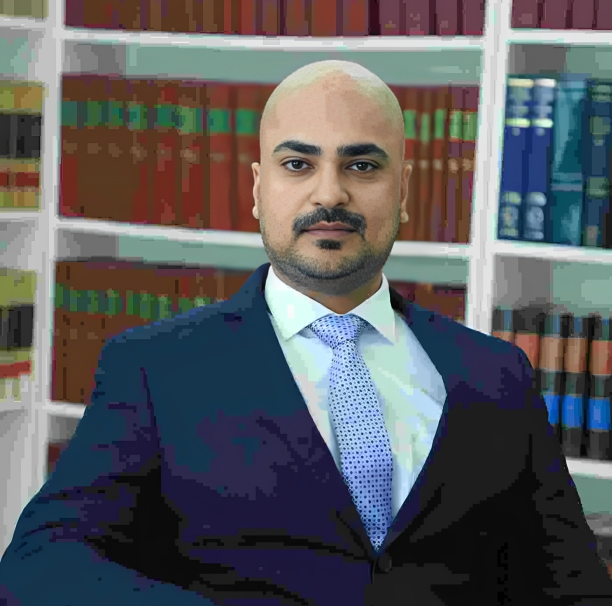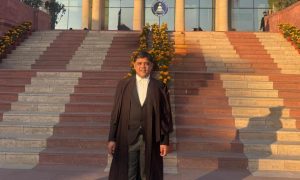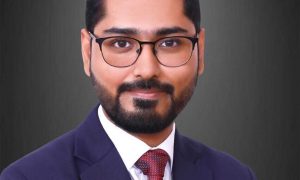This interview has been published by Anshi Mudgal and The SuperLawyer Team

After completing your Bachelor’s in Technology in Electronics and Communication, you decided to pursue a career in law. What inspired this shift, and how has your technical background contributed to your legal career?
While I was doing my undergraduate studies in Electronics and Communication Engineering, I developed a strong appreciation for structured problem-solving and analytical thinking. A pivotal moment came when I worked on a project involving video capturing and recognition technology for identifying letters and numbers on car plates. After dedicating significant time and effort to develop this innovation, I discovered that a subsequent batch had replicated my idea for their project. This sparked a deep curiosity in me on how I could protect my work and ensure exclusive rights over something I had created.
This realization led me to explore the legal frameworks that govern innovation and ownership. While I thoroughly enjoyed the technical challenges of engineering, I found myself increasingly drawn to the interplay between technology, commerce, and human interaction—how ideas are protected, commercialized, and integrated into society. This marked the beginning of my journey into the field of law and specially, intellectual property law. I decided to pursue law, with a clear objective to practice IP law once I graduate.
When I began my legal journey, I recognized a clear gap in the market—clients, much like myself in my engineering days, were increasingly seeking nuanced, technology-driven solutions to complex intellectual property challenges, particularly around ownership and innovation. In that moment, I knew I had found my calling.
How did your L.L.M. at Boston University School of Law shape your perspective on Intellectual Property law, and how have the skills and experiences gained there influenced your approach to high-stakes International and domestic IP litigation and advisory?
My LL.M. at Boston University School of Law was a transformative experience that significantly shaped my approach to Intellectual Property law. Beyond the rigorous academic curriculum, one of the most valuable takeaways was learning how to move beyond theoretical understanding and apply legal principles in a practical and commercial context. I had taken classes on trial court advocacy, legal writing, and related practical modules, the insights from which continue to guide my approach to legal practice even today.
Having students from all over the world, not only helped me build lasting professional relationships which I continue to maintain to this day, but also fostered a global legal mindset that has helped me while advising or litigating matters involving international stakeholders.
I strongly encourage those looking to specialize in a particular field of law to pursue a Master’s degree, as it offers both depth of knowledge and invaluable exposure to diverse legal perspectives.
Having worked with various prominent IP law firms, what motivated you to transition to establishing your own practice, what were the hurdles that you faced while founding Nikhil Chawla and Associates?
When I founded Nikhil Chawla and Associates, like with any new venture, the initial phase came with its share of challenges—building a client base, establishing credibility, and navigating the uncertainty that comes with stepping out independently. There were days where I found myself questioning my decision of starting on my own.
During this time, I had the opportunity to interact with several senior advocates. One piece of advice from Swathi Sukumar, Senior Advocate, particularly stayed with me—she said, “you just have to show up at the office every day, the work will eventually come.” That simple yet profound advice became a guiding principle for me in the early days, reinforcing the importance of persistence, presence, and consistency in building a practice.
6 months of feeling doubtful about everything and no sign of progress is the entry price that you have to pay before things start to move in the right direction. Having said that, with relentless hard work and unwavering dedication, you will find yourself moving in the right direction—without it, you risk getting lost in the vast sea of lawyers around you.
As a dual-qualified lawyer and an AI enthusiast and Certified Information Privacy Professional, how do you see the intersection of AI, data protection, and privacy laws evolving in the near future?
The intersection of AI, data protection, and privacy law has become, if not already, the most consequential area of legal and regulatory evolution in the modern era.
With the enactment of the Digital Personal Data Protection Act, 2023, India has taken a foundational step toward codifying privacy rights and data protection obligations. However, the law still leaves several gaps when it comes to regulating AI-specific concerns such as algorithmic transparency, automated decision-making, and the right to explanation. In parallel, India is also formulating its National Strategy for Artificial Intelligence and has published ethical AI guidelines through NITI Aayog. These developments signal the government’s intent to promote responsible AI while safeguarding individual rights.
All of us are already aware that AI has become omnipresent and part of our everyday lives. However, its widespread adoption also raises critical legal and ethical questions ranging from informed consent, purpose limitation, and data minimization to algorithmic accountability. In parallel, concerns around bias, discrimination, and automated profiling are becoming more pronounced. These issues are steadily making their way to the forefront of legal discourse, and our legal systems will soon be called upon to adjudicate upon this, drawing a clear Lakshman Rekha between what is permissible and what is not.
Going forward, professionals with a grounding in both law and technology will be key to shaping this transition, ensuring that innovation does not come at the cost of civil liberties. I believe the future will require lawyers who understand code, technologists who understand rights, and courts who can bridge both worlds.
Could you share your experience while representing a leading music label in a high-profile copyright infringement dispute against an internationally renowned hip-hop artist. How did you prepare for such a case and what were the key outcomes?
When I started my private practice, the first case I was entrusted with involved handling a dispute against the renowned hip hop/rap artist Bohemia. I was representing a music company that had entered into an exclusive artist agreement with Bohemia, which he breached by collaborating with other parties in violation of the agreement’s terms.
During our preparation for this case, we knew that seeking specific enforcement of personal service obligations was not permissible under the Specific Relief Act. However, we were able to identify a negative covenant in the agreement that prohibited him from collaborating with third-party labels during the term of the agreement. We also found legal precedents supporting the enforcement of such negative covenants in agreements involving personal qualifications.
As a result, on the very first day, we secured an ad interim order restraining Bohemia from working with any third-party labels for the remainder of the agreement’s term. This interim injunction ultimately paved the way for an early settlement.
After the settlement, Bohemia even released a track referencing the litigation. The success in the Bohemia matter opened the door for me to handle other high-profile media and entertainment disputes, including cases involving prominent artists such as Badshah and Satinder Sartaaj.
What advice would you offer to young professionals aspiring to follow in your footsteps and build successful careers in intellectual property, technology law, and commercial litigation?
Law is a profession that demands dedication and discipline, it is meant for those who truly love the law. Without that passion, it’s difficult to sustain the commitment the profession requires.
Talking from my own experience, when I had started my legal career, I sometimes relied on shortcuts instead of diligently reading statutes and studying case law. Over time, I came to realize that true success in this profession requires depth, being thorough with the law and cultivating a strong understanding of legal principles. Unfortunately, I see many young professionals today falling into the same trap. What we truly need are students and professionals committed to rigorous legal study and a genuine passion for the craft of law.
It is important to be working with a good mentor, someone who can guide, challenge, and shape you. Equally important is being at the right firm/advocate, where the work culture, values, and opportunities align with your long-term goals.
Get in touch with Nikhil Chawla –

























